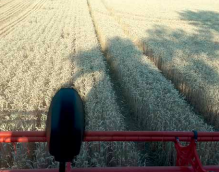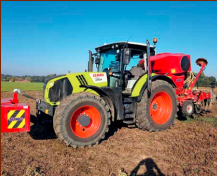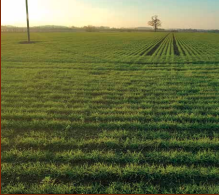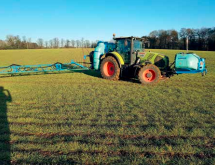February 2019

Despite not really wanting to start off with the weather it’s had such a significant impact on the farm in the last 12 months that I can’t really avoid it. Despite the late spring/early summer of 2017 being overly dry compared to an ‘average’ (what’s one of those anymore?) year, it turns out that here in Essex, 2018 was even worse for us! Once the ground had dried out enough to get the spring barley and beans in the ground in the 3rd week of April I can recall we had one significant rain event a week or so post drilling and that turned out to be pretty much it until August! An out of action weather station means I haven’t got any exact recorded figures for rainfall in the period but the couple of times we did get something fall out of the sky we were talking 2-3 mm max which just disappeared instantly with the ground being so dry and the temperatures so high.
The Wheat’s looked like they were holding on ok, as was the W Barley and OSR for a considerable time into the drought, a benefit of the strip-till system, until we got to the point where it didn’t matter what establishment system would have been used, any wheat or barley on lighter land really started to suffer very visibly. This was evident come harvest, with one light and gravelly block of 1st wheat that had been looking like it was struggling for weeks yielded approx. 60t off of 40 acres going by the trailer counting method. (Pic below of cutting that Wheat in late July).

The full toll of the damage on the 1st wheats hasn’t been fully realised yet as it’s still all in the shed due for movement later this year but the heap is not as big as I would like. Kerrin as a 2nd wheat did well for us despite the year with a few light patches pulling down the average but I will take 7.7t/ha in the year we just had. The OSR ironically suffered from wet feet over the winter on about 15 acres of the 70 we planted with next to nothing left growing on that area coming out of winter. We addressed some of the issues with some drainage work in the summer after harvest but the 55 acres we did cut, 3.4t/ha, again not great but it could have been worse.
Bazooka W Barley was disappointing especially for a hybrid but there’s only so much stress these crops can take and a couple of fields suffered from my lack of patience in September 2017 and perhaps weren’t as dry as they could have been when drilled which hampered establishment in places, there is still some crop sold in the shed so final exact yield isn’t known yet but estimating 6t/ha so not very impressive really. The spring crops really suffered compared to the winter crops almost from the day they were drilled, the beans especially which were very short and very few pods come harvest from aborted flowers due to the stress! I won’t shy away from the overall yield as we have to show the bad and the good but I’ll let you work it out, 28t sold off 28ha… no more said.
The spring barley didn’t tiller as it would normally and come harvest the crop had died before even being fully ripe with heads still pointing skywards rather than brackling over as usual but the grain was coming off at 12-13% moisture! Harvest started in the W Barley on the 16th of July, our earliest start since 1976, and we had done everything apart from the spring beans by the 3rd of August. The beans held on until the end of August till they were properly ready to harvest and were dry enough after a few showers but we managed to not have to put a single grain through the grain drier for harvest 2018 which I suppose is one small positive. The new combine for 2018 flew through the crops without a hitch, the addition of the chaff spreader gave visibly better spread of crop residues back onto the stubbles which I believe has helped a lot with the following crops this autumn.

Winter crops for harvest 2019 went in very well with almost perfect sowing conditions for wheat and barley in October 18 and even by late October the couple of fields I delayed drilling due to Blackgrass still went in a treat! The only slight ‘hiccup’ being a complete failure of the front diff on our drilling/spraying tractor whilst out drilling wheat meaning being hauled back to the workshop on the low loader and out of action for a month whilst the work was done to fix it. Luckily Manns sorted us out with another tractor (on the drill in the pic below) to get us going again to finish drilling which was very much appreciated!
Wheat in the 1st wheat slot has been switched from the old timer Claire which has done us well over the years to a new kid on the block called Elicit and is looking good so far (Pic below taken on the 20th of Jan!)

The warmer weather has caused a greater than ideal level of mildew in the KWS Orwell Barley we are growing this year but it’s first dose of N, some Mn through the sprayer (in the pic below on the 14th of Feb) and finally a reasonable rain hopefully will have perked it up a bit though we may go through with a T0 in the coming weeks to keep a lid on disease.
The OSR sown in the 3rd week of August, having waited for it to finally rain and provide enough moisture for establishment, has got away well apart from a few random bare patches which don’t match up with the drill, sprayer or anything so I’m putting it down to slugs though I found very few on the surface. Now into February, its had its first dose of 60 kg/ha of N plus some P, K and S and with the warmer weather its really started to motor on. What I am pleased about is that despite finding the odd flea beetle at night when the crop was at the 2 cotyledon stage I held off spraying and the crop grew past any damage and larvae numbers in the plant now, although some are present, are quite hard to find and don’t seem to be holding the crop back unlike some reports I have heard. I doubt it’s anything I have done specifically, I’ll just put it down to luck!

Cover crops of radish and oats prior to spring crops for 2019 went into ideal conditions in late August and early September and grew very well, they have been destroyed with a pass of Kyleo in mid Jan and for this year we have dropped beans in favour of combinable peas and switched from KWS Irena to RGT Planet for our spring barley. Drilling to commence soon hopefully although I do fear that mother nature will try and makeup for this dry spell we are still in at some point and it will take a considerable amount of rainfall to do so, ditches and ponds that we would normally see with a few feet of water in at this time of year have nothing in at all, something I am told has not been seen before! Could be interesting times ahead and that’s without even mentioning Br…..
